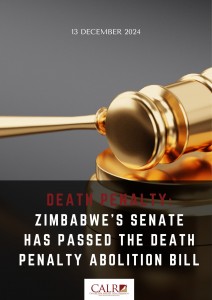- December 13, 2024
- Posted by: Clever K Mlambo
- Category: News

In a significant stride towards human rights advancement, Zimbabwe’s Senate has passed the Abolition of the Death Penalty Bill, paving the way for the elimination of capital punishment from its legal framework. This decision reflects a growing recognition of the sanctity of life and aligns with constitutional principles that prioritise human dignity.
The movement to abolish the death penalty in Zimbabwe was bolstered by a comprehensive legislative reform process initiated by the Ministry of Justice, Legal and Parliamentary Affairs (MoJLPA) with technical support from the Centre for Applied Legal Research (CALR) and the Switzerland Embassy to Malawi, Zambia and Zimbabwe. Albeit of advocacy initiatives that have started as far back as 2015, CALR facilitated official policy dialogues between government officials, security sector representatives, and civil society organisations through convening a high-level consultative meeting that was held in Kadoma on the 5th and 6th of November 2022. The main objective was for the Government of Zimbabwe, through MoJLPA, to develop its official position.
The Kadoma meeting was chaired by the Minister of Justice, Legal and Parliamentary Affairs Honourable Ziyambi. Ziyambi, accompanied by the Permanent Secretary in the Ministry of Justice (as she then was), Ms. V. Mabiza, as well as representatives from the Drafting Division of the Attorney General’s Office, Ministry of Defence and Security, Zimbabwe Prisons and Correctional Service, National Prosecuting Authority, Judicial Services Commission, National Chiefs Councils, Parliament of Zimbabwe and several representatives from civil society organisations gathered and had a robust discussion on the death penalty in Zimbabwe.

Notably, this high-level consultative meeting culminated in overwhelmingly recommending reforming the Criminal Law (Codification and Reform) Act [Chapter 9:23] and the Criminal Procedure and Evidence Act [Chapter 9:07]. However, the principal recommendation from this meeting was the need to consult the public concerning this subject. As such MoJLPA in partnership with CALR, in March and April 2023, conducted nationwide consultative meetings on the death penalty in Zimbabwe. These consultations culminated in a report that was produced by the Ministry of Justice capturing people’s views regarding the death penalty.
This led to the development of a memorandum of principles and a draft Death Penalty Abolition Bill. In light of this process, the Cabinet of Zimbabwe officially endorsed the abolition of the death penalty in February 2024. The Bill was subsequently subjected to a Parliamentary law-making process and passed by both houses on the 12th of December 2024, now awaiting presidential assent. This legislative milestone not only signifies progress within Zimbabwe but also positions it alongside many other nations that have moved away from this punitive measure.
CALR remains committed to supporting ongoing law reform initiatives aimed at aligning existing legislation with modern constitutional values established after Zimbabwe adopted its Constitution in 2013. The organisation continues to work collaboratively with various State and Non-State to ensure that legal frameworks reflect contemporary understandings of justice, rule of law and human rights.
